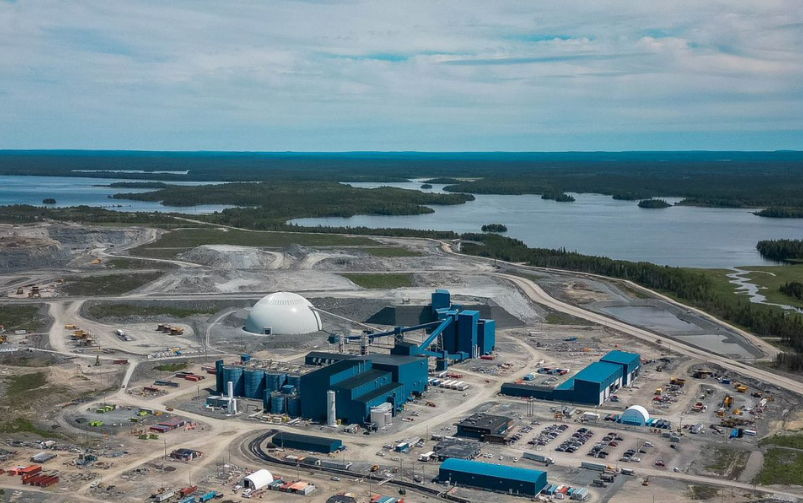Fission Uranium’s PLS uranium mine project in Saskatchewan’s Athabasca Basin region is expected to cost $1.16 billion and will take three years to construct. Courtesy of Fission Uranium Corp.
Welcome back to your weekly mining news recap, where we catch you up on some of the news you may have missed. This week’s headlines include Canada taking the top spot on a global battery supply chain ranking, unionized employees at Champion Iron’s Bloom Lake voting for strike action and Volt Lithium producing saleable lithium carbonate.
Western Australian gold miner Red 5 Ltd. is planning to acquire Silver Lake Resources, as reported by Northern Ontario Business. Silver Lake Resources’ mothballed Sugar Zone gold mine, located north of White River, Ontario, would be part of the “merger of equals” if the deal goes through. The deal is valued at $1.9 billion and is expected to close in June. This news comes amidst a recent flurry of interest from Australian-based mining companies turning to Canada’s abundant supply of mineral resources.
Canada has risen to the top of the fourth edition of energy research organization BloombergNEF’s recent global lithium-ion battery supply chain ranking, which is the first time China has not topped the list, as reported by Electric Autonomy Canada. The ranking examines 30 countries’ potential to develop a secure, reliable and sustainable supply chain for the production of lithium-ion batteries, using 46 different metrics across five categories to guide the rankings. BNEF said that Canada’s rise to first place was due to its consistent manufacturing and production advances, as well as its strong environmental, social and governance (ESG) credentials.
Volt Lithium Corp. recently announced that it had successfully produced battery-grade lithium carbonate at its demonstration plant in Calgary. The company processed oilfield brine from its Rainbow Lake project and refined it into lithium carbonate using its direct lithium extraction (DLE) technology.
Fission Uranium Corp. has an agreement to raise $75 million to advance its PLS uranium project in Saskatchewan, as reported by Canadian Mining Journal. The bought deal financing with Canaccord Genuity and SCP Resource Finance would generate the funds through the sale of roughly 65.6 million common shares of Fission, with each share valued at $1.18. According to a feasibility study submitted in March 2023, the uranium project, located in Saskatchewan’s Athabasca Basin region, is expected to take three years and $1.16 billion to construct, and will have a mine life of 10 years.
According to Reuters’ latest poll of analysts, the demand for base metals in 2024 is expected to drag. Copper and aluminum, however, may experience average higher prices this year. Zinc, lead and tin are expected to experience a moderate drop in prices. Due to its use in the development of electric vehicle batteries, nickel could encourage the most demand, but a wave of new production from Indonesia means there is a glut of supply for the short term.
Canada Nickel Co. announced it intends to develop two mineral processing facilities in Ontario, including a nickel processing plant and a stainless steel and alloy production plant, as reported by The Financial Post. The facilities would be located near Timmins. If constructed, the nickel processing plant would cost US$1 billion and would be North America’s largest nickel processing plant upon completion, with expected throughput of over 80,000 metric tonnes per year. The company expects its nickel processing facility to commence production by 2027.
Unionized employees at Champion Iron’s Bloom Lake iron ore mine in Quebec have rejected the company’s proposed collective bargaining agreement (CBA) and voted for a strike mandate, as reported by Engineering News. The Syndicat des Métallos represents the unionized workers, which comprise 63 per cent of Bloom Lake’s workforce. The mandate grants the union the right to initiate a strike at any time if ongoing discussions do not finalize a new CBA, but Champion Iron said the ongoing discussions and the strike mandate have not impacted the mine’s operations at this time.
When she was new to Canada and looking to establish herself in the mining industry, Sekai Musoki knew she would have to break glass ceilings to advance her career. In the December/January issue of CIM Magazine, Musoki, now principal of construction for digital systems for BHP in Saskatchewan, discussed with Alice Martin how she has used her experience to help BIPOC women break through barriers in engineering.
That’s all for this week. If you’ve got feedback, you can always reach us at editor@cim.org. If you’ve got something to add, why not join the conversation on our Facebook, Twitter, LinkedIn or Instagram pages?




